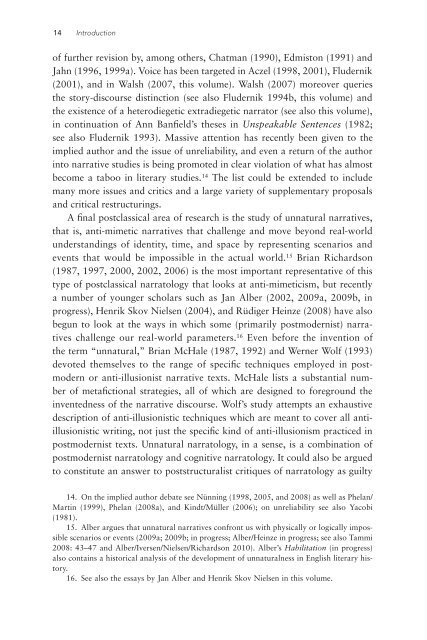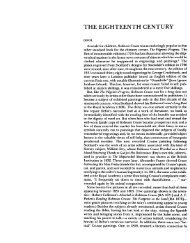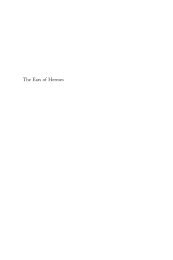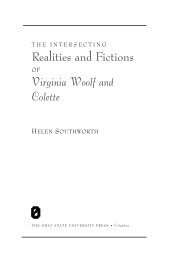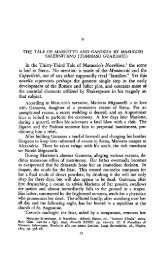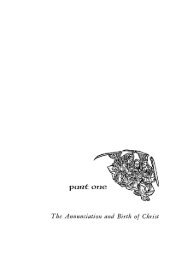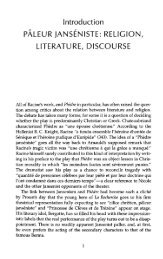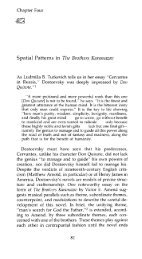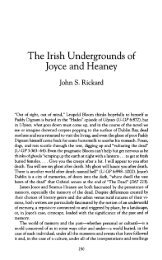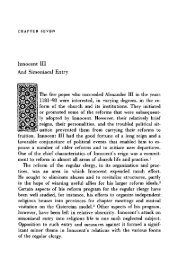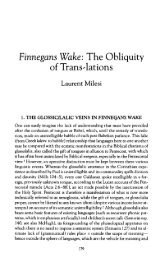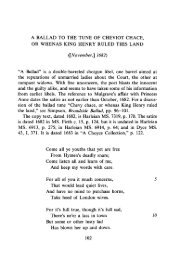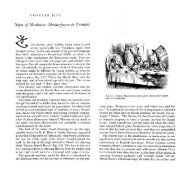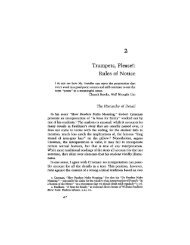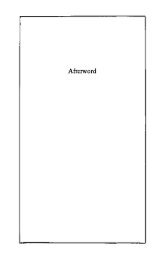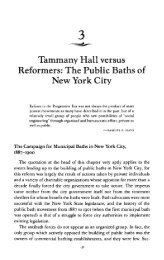Postclassical Narratology: Approaches and Analyses
Postclassical Narratology: Approaches and Analyses
Postclassical Narratology: Approaches and Analyses
You also want an ePaper? Increase the reach of your titles
YUMPU automatically turns print PDFs into web optimized ePapers that Google loves.
14 Introduction<br />
of further revision by, among others, Chatman (1990), Edmiston (1991) <strong>and</strong><br />
Jahn (1996, 1999a). Voice has been targeted in Aczel (1998, 2001), Fludernik<br />
(2001), <strong>and</strong> in Walsh (2007, this volume). Walsh (2007) moreover queries<br />
the story-discourse distinction (see also Fludernik 1994b, this volume) <strong>and</strong><br />
the existence of a heterodiegetic extradiegetic narrator (see also this volume),<br />
in continuation of Ann Banfield’s theses in Unspeakable Sentences (1982;<br />
see also Fludernik 1993). Massive attention has recently been given to the<br />
implied author <strong>and</strong> the issue of unreliability, <strong>and</strong> even a return of the author<br />
into narrative studies is being promoted in clear violation of what has almost<br />
become a taboo in literary studies. 14 The list could be extended to include<br />
many more issues <strong>and</strong> critics <strong>and</strong> a large variety of supplementary proposals<br />
<strong>and</strong> critical restructurings.<br />
A final postclassical area of research is the study of unnatural narratives,<br />
that is, anti-mimetic narratives that challenge <strong>and</strong> move beyond real-world<br />
underst<strong>and</strong>ings of identity, time, <strong>and</strong> space by representing scenarios <strong>and</strong><br />
events that would be impossible in the actual world. 15 Brian Richardson<br />
(1987, 1997, 2000, 2002, 2006) is the most important representative of this<br />
type of postclassical narratology that looks at anti-mimeticism, but recently<br />
a number of younger scholars such as Jan Alber (2002, 2009a, 2009b, in<br />
progress), Henrik Skov Nielsen (2004), <strong>and</strong> Rüdiger Heinze (2008) have also<br />
begun to look at the ways in which some (primarily postmodernist) narratives<br />
challenge our real-world parameters. 16 Even before the invention of<br />
the term “unnatural,” Brian McHale (1987, 1992) <strong>and</strong> Werner Wolf (1993)<br />
devoted themselves to the range of specific techniques employed in postmodern<br />
or anti-illusionist narrative texts. McHale lists a substantial number<br />
of metafictional strategies, all of which are designed to foreground the<br />
inventedness of the narrative discourse. Wolf’s study attempts an exhaustive<br />
description of anti-illusionistic techniques which are meant to cover all antiillusionistic<br />
writing, not just the specific kind of anti-illusionism practiced in<br />
postmodernist texts. Unnatural narratology, in a sense, is a combination of<br />
postmodernist narratology <strong>and</strong> cognitive narratology. It could also be argued<br />
to constitute an answer to poststructuralist critiques of narratology as guilty<br />
14. On the implied author debate see Nünning (1998, 2005, <strong>and</strong> 2008) as well as Phelan/<br />
Martin (1999), Phelan (2008a), <strong>and</strong> Kindt/Müller (2006); on unreliability see also Yacobi<br />
(1981).<br />
15. Alber argues that unnatural narratives confront us with physically or logically impossible<br />
scenarios or events (2009a; 2009b; in progress; Alber/Heinze in progress; see also Tammi<br />
2008: 43–47 <strong>and</strong> Alber/Iversen/Nielsen/Richardson 2010). Alber’s Habilitation (in progress)<br />
also contains a historical analysis of the development of unnaturalness in English literary history.<br />
16. See also the essays by Jan Alber <strong>and</strong> Henrik Skov Nielsen in this volume.


